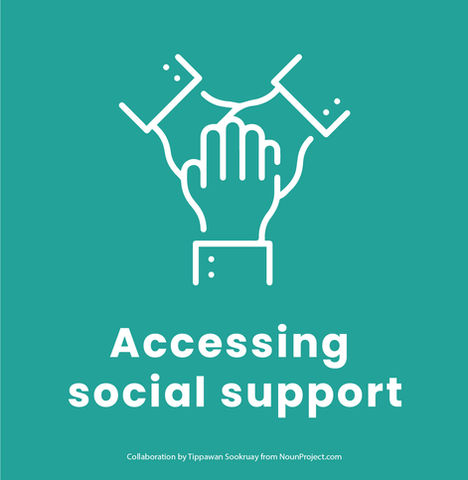
WHAT IS PROBLEM
MANAGEMENT PLUS?
WHY TASK-SHARING?
Task-sharing can help address gaps in mental health care, because support is provided by trusted community members who understand the clients’ cultural context. It can also provide a gateway to care for those in need of more specialized services.

TREATMENT GAP.

1 out of 5 people in high-income countries such as the U.S. do not receive minimally adequate care for depression.
Thornicroft, G., Chatterji, S., Evans-Lacko, S., Gruber, M., Sampson, N., Aguilar-Gaxiola, S., . . . Kessler, R. (2017). Undertreatment of people with major depressive disorder in 21 countries. British Journal of Psychiatry, 210(2), 119-124. doi:10.1192/bjp.bp.116.188078

The treatment gap is even higher for persons from certain groups. One of the main barriers is the lack of mental health professionals who share similar backgrounds or lived experiences.
Citation: American Psychological Association. Demographics of the U.S. psychology workforce: Findings from the American Community Survey. Washington, D.C., 2015.
WHAT IS
TASK-SHARING?
People with no formal education or specialized training in mental health are trained to deliver high-quality mental health and psychosocial support services. Care provided by non-specialists has been found to:
-
Reduce concerns around help seeking
-
Reduce symptoms of emotional distress
-
Improve quality of life
-
Be cost-effective
Task-sharing initiatives are being adapted and innovated in different contexts across the globe. Providers include community health workers, midwives and nurses, teachers and mentors, religious leaders, traditional healers, and even peers. With RECOUP-NY, we are providing mental health support skills training to social service providers, who are already working closely with individuals exposed to adversity and chronic stressors.
“People who are un-lettered have been taking care of each other throughout time. The clinician is not the lead here, it’s the person who has the concern – an important shift in paradigm.”
- PM+ Helper, NYC
Developed by the World Health Organization, Problem
Management Plus (PM+) is a mental health approach that trains non-specialists to deliver a 5 session mental health support program to adults experiencing distress and who may have difficulty accessing mental health services. PM+ can help people struggling with depression, anxiety, stress and other reactions to adversity, as well as practical problems. Participation in PM+ has been shown to decrease overall psychological distress, depression, and anxiety in studies conducted in Kenya, Pakistan, and Nepal. Modifying and adapting the intervention to meet the needs of specific cultures, contexts and individual experiences is important before implementing in new settings.
Clients learn 4 skills to help manage practical and emotional problems:
TRAINING PM+
HELPERS.

Staff at community organizations across NYC will be trained to become PM+ helpers. The process begins with intensive group training and continues with close supervision to prepare staff to provide PM+ to their clients.
Our team has been iteratively adapting the training model to accommodate remote work and varying staff schedules. The training is an immersive experience focused on experiential learning, live practice, observation and ongoing feedback. It can take place over 2 consecutive weeks or in a course-style model over 6-10 weekly group sessions. Staff learn basic helping skills, how to conduct assessments and identify those in need of additional support, and how to teach the PM+ skills.
COMPETENCY- BASED TRAINING.
Scaling up the delivery of psychological services by non-specialists requires an understanding of the relationship between helper competency and client outcomes, and a way to systematically evaluate competencies of non-specialists. Competency refers to demonstration of the skills needed to safely and effectively deliver an intervention. Key competencies for non-specialist mental health providers include being able to safely deliver services and minimize risks of harm.
The EQUIP (Ensuring Quality in Psychological Support) platform will be used to assess and monitor competencies in helpers on an ongoing basis. Tested and well validated tools will be used to enhance training and supervision and ensure the delivery of safe, effective and high-quality services.
WHAT DOES
PM+ LOOK LIKE
IN PRACTICE?
Trainers at The New School will provide ongoing supervision and support for helpers following the cultural adaptation of PM+, a process designed to ensure PM+ aligns with the structure and context of each community-based organization, as well as the needs and constraints of participants.
PM+
Training
Staff at community-based organizations (CBO) are trained to become PM+ helpers.
PM+
Supervision
PM+ helpers receive close supervision on several low-risk cases in preparation for providing PM+ to participants. Weekly supervision continues throughout the course of PM+ delivery.
PM+
Delivery
PM+ helpers deliver the
5-session program to PM+ participants- CBO clients who are experiencing distress. Research assistants conduct assessments before and after delivery to track participant progress.
Collaborative cultural adaptation of PM+ begins prior to training and continues as helpers begin to deliver PM+.
PATHWAYS OF CARE




